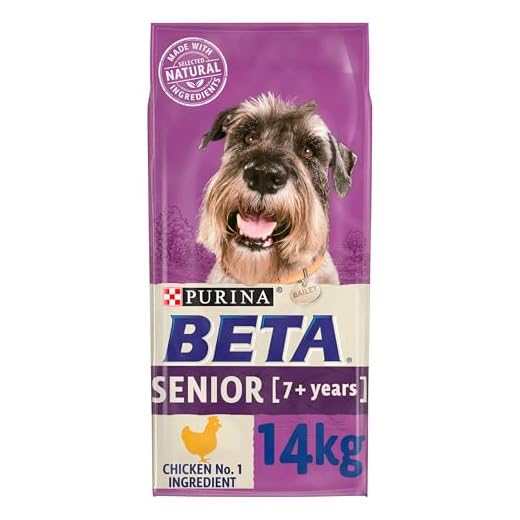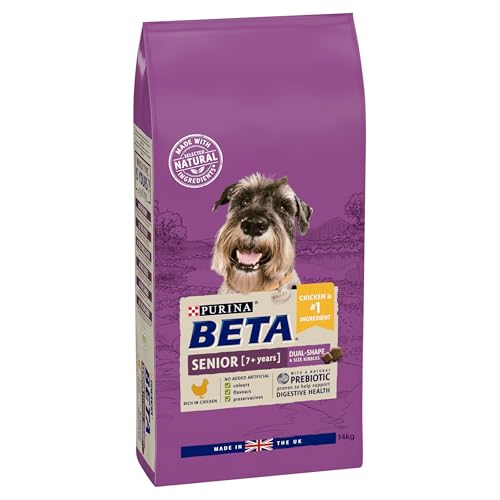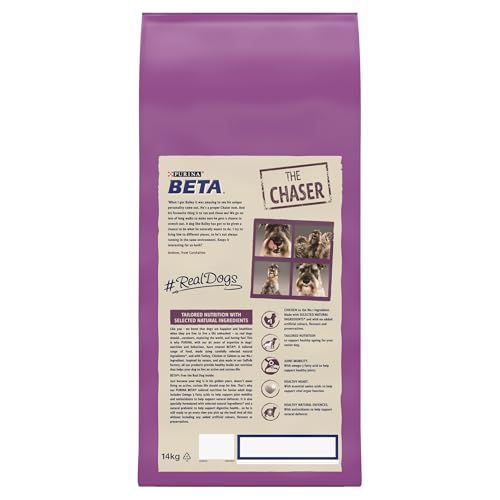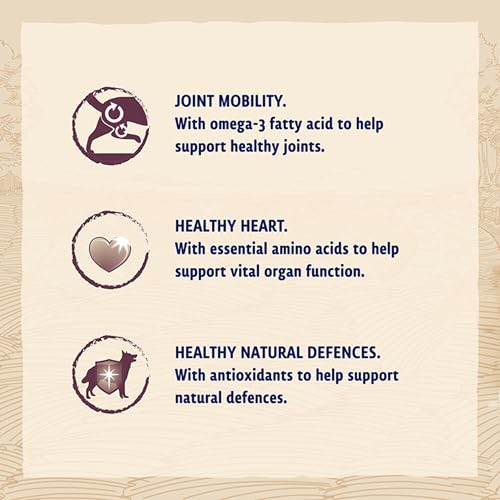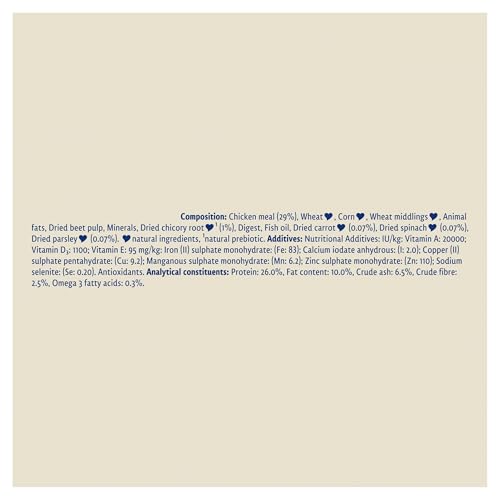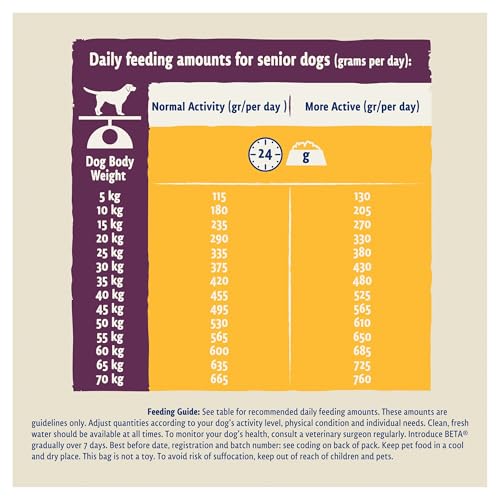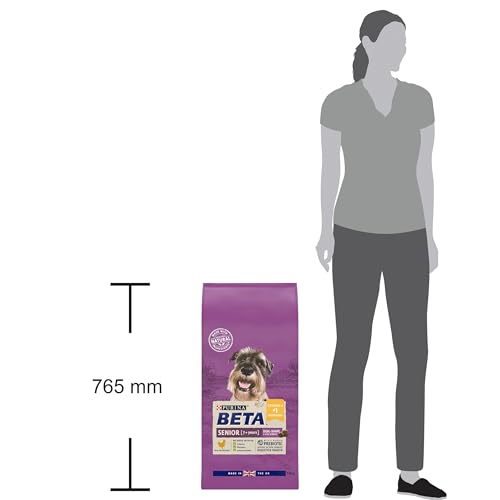




As a devoted owner of a senior Golden Retriever, I’ve come to understand that choosing the right food for my ageing companion is more than just a routine task; it’s a crucial aspect of ensuring his health and happiness. Senior Golden Retrievers have specific nutritional needs that differ significantly from their younger counterparts, and selecting the appropriate diet can make a remarkable difference in their quality of life. This journey of finding the best dog food has taught me valuable lessons that I am eager to share.
Golden Retrievers are known for their friendly disposition and boundless energy, but as they age, their metabolism slows down, and they become more prone to various health issues such as joint problems, obesity, and decreased cognitive function. Recognising these changes, I sought out dog foods specifically formulated for senior dogs, focusing on ingredients that promote joint health, support cognitive function, and help maintain an ideal weight. Through research and consultation with veterinarians, I discovered key components that make a dog food suitable for senior Golden Retrievers.
In this article, I will delve into the essential nutrients that your senior Golden Retriever needs, the benefits of high-quality ingredients, and the brands that have stood out in providing balanced and effective diets for ageing dogs. Whether you are just starting your journey with a senior Golden Retriever or looking to improve your current feeding regimen, my goal is to provide you with comprehensive information to make informed decisions about your pet’s nutrition. Your Golden Retriever deserves the best, and with the right food, you can help them enjoy their golden years to the fullest.
Optimal Nutrition for Older Golden Retrievers
As my Golden Retriever started to age, I noticed subtle changes in his energy levels and overall health. Ensuring he receives the best possible diet tailored to his senior needs became a priority. The right food can significantly impact his quality of life, maintaining his vitality and supporting his ageing joints.
It’s essential to choose a diet that meets the specific requirements of senior Golden Retrievers. This includes considering factors like lower calorie content to prevent obesity, higher protein levels to maintain muscle mass, and added joint support ingredients to help with mobility issues. Here’s a guide based on my experiences and research to help you select the most suitable food for your elderly furry friend.
Key Nutritional Elements
When selecting dog food for an older Golden Retriever, it’s crucial to look at the ingredient list and nutritional content. Here are the key elements to focus on:
- Protein: Older dogs need high-quality protein to preserve muscle mass. Look for sources like chicken, lamb, or fish.
- Fats: Healthy fats are important for brain health and energy. Omega-3 and Omega-6 fatty acids also help with skin and coat condition.
- Fibre: Adequate fibre helps with digestion and keeps the gastrointestinal tract healthy. Ingredients like sweet potatoes, brown rice, and oats are beneficial.
- Joint Support: Ingredients such as glucosamine and chondroitin can aid in maintaining joint health and mobility.
- Antioxidants: Vitamins E and C, as well as fruits and vegetables, help boost the immune system.
Each of these elements plays a significant role in the overall health of a senior dog. Ensuring that their diet includes these can lead to a happier and healthier life.
Recommended Dog Food Options
After trying several brands and formulations, I found a few that particularly stood out for their balanced nutrition and positive impact on my Golden Retriever’s health. Here are my top recommendations:
- Hill’s Science Diet Senior: This formula is tailored specifically for senior dogs, with a focus on joint health and easy digestibility. It includes balanced minerals for heart and kidney health.
- Royal Canin Golden Retriever Senior: Designed specifically for Golden Retrievers, this food supports cardiac health and has an optimal calorie content to maintain an ideal weight.
- Blue Buffalo Life Protection Formula Senior: With high-quality protein and L-carnitine for lean muscle maintenance, this food also contains glucosamine and chondroitin for joint support.
Switching to these foods made a noticeable difference in my dog’s energy levels and overall wellbeing. Each dog is unique, so it might take some trial and error to find the perfect match for your Golden Retriever. Always consult with your vet before making any significant changes to your pet’s diet to ensure it meets their specific health needs.
The Importance of Selecting the Ideal Diet for Your Senior Golden Retriever
As my Golden Retriever ages, I’ve come to understand the significant impact of providing the right nutrition. Older dogs have different dietary requirements compared to their younger counterparts. Their metabolism slows down, and they are more prone to various health issues such as arthritis, heart disease, and obesity. This makes it crucial to ensure they receive food specifically tailored to support their ageing bodies.
Choosing the right diet can enhance my senior Golden Retriever’s quality of life, extending their lifespan and keeping them happy and active. Proper nutrition can help manage weight, improve joint health, and maintain a healthy coat and skin. It’s not just about the quantity of food but also about the quality and the specific nutrients that cater to their changing needs.
Key Nutritional Considerations for Senior Golden Retrievers
- Protein: As dogs age, maintaining muscle mass becomes vital. High-quality protein sources can help support muscle maintenance and repair.
- Joint Support: Ingredients like glucosamine and chondroitin are essential for joint health, which is particularly important for Golden Retrievers prone to hip dysplasia and arthritis.
- Digestibility: Older dogs often have sensitive stomachs. Easily digestible ingredients can prevent gastrointestinal issues and ensure they absorb nutrients effectively.
- Weight Management: Reduced activity levels mean fewer calories are needed. A diet low in calories but high in nutrients can help prevent obesity, a common issue in senior dogs.
- Omega Fatty Acids: Omega-3 and Omega-6 fatty acids support skin and coat health, and can also have anti-inflammatory effects that benefit joint health.
- Antioxidants: These can boost the immune system and protect against cellular damage, contributing to overall health and longevity.
By focusing on these specific nutritional needs, I can ensure my senior Golden Retriever remains as healthy and vibrant as possible. Investing time in researching and selecting the appropriate food is an essential part of being a responsible pet owner, and the rewards are evident in the improved wellbeing of my beloved companion.
Nutritional Needs for Senior Golden Retrievers
As our beloved Golden Retrievers age, their dietary requirements change significantly. It’s essential to adjust their nutrition to support their ageing bodies and maintain their quality of life. I’ve noticed that providing the right nutrients can make a world of difference in their overall health and vitality.
Understanding what an older Golden Retriever needs can help in selecting the best food options to ensure they remain healthy and active in their golden years. Here are the key nutritional considerations I’ve found to be crucial for senior Goldens.
Essential Nutrients for Older Golden Retrievers
- Protein: Maintaining muscle mass is crucial for senior dogs. Opt for high-quality protein sources like chicken, fish, or lamb to support muscle maintenance and repair.
- Fats: Healthy fats, such as omega-3 and omega-6 fatty acids, are vital for joint health and coat condition. These fats can help manage inflammation and keep their skin and fur in top condition.
- Fibre: Older Goldens often need more fibre to aid digestion and maintain a healthy weight. Ingredients like sweet potatoes and brown rice can provide the necessary fibre content.
- Antioxidants: Antioxidants from fruits and vegetables, like blueberries and spinach, can help boost their immune system and protect against age-related diseases.
- Glucosamine and Chondroitin: These supplements are crucial for joint health, especially in larger breeds prone to arthritis. They help maintain cartilage and ease joint pain.
- Vitamins and Minerals: Ensuring a balanced intake of essential vitamins and minerals supports overall health. Vitamin E and B vitamins are particularly important for skin health and energy metabolism.
- Caloric Intake: Senior dogs typically require fewer calories due to decreased activity levels. It’s important to adjust their food intake to prevent obesity while ensuring they receive all necessary nutrients.
By focusing on these nutritional needs, you can help your senior Golden Retriever lead a healthier, happier life. Tailoring their diet to meet these requirements can significantly impact their longevity and well-being.
Best Types of Dog Food for Senior Golden Retrievers
Caring for an ageing Golden Retriever requires attention to their changing dietary needs. As they grow older, their metabolism slows down, and they may develop health issues that necessitate a specialised diet. Choosing the right food for your senior Golden Retriever is crucial to maintaining their health and vitality.
When selecting food for an older Golden Retriever, it’s important to consider several factors, such as joint health, weight management, and digestive support. Nutritional needs change with age, and ensuring that these needs are met can help your dog live a happier and healthier life.
Nutritional Considerations for Older Golden Retrievers
- Joint Health: Senior Golden Retrievers often suffer from arthritis and joint pain. Look for foods rich in glucosamine and chondroitin, which support joint function and mobility.
- Weight Management: Older dogs tend to be less active, making weight control vital. Opt for low-calorie formulas to prevent obesity, which can exacerbate joint problems and other health issues.
- Digestive Support: As dogs age, their digestive systems become more sensitive. High-fibre foods can aid in digestion and improve overall gut health.
- Protein Quality: Ensure that your dog’s food contains high-quality protein sources. This supports muscle maintenance and overall energy levels.
- Omega Fatty Acids: Foods enriched with omega-3 and omega-6 fatty acids promote a healthy coat and skin, and can also have anti-inflammatory benefits.
In addition to these key nutritional components, it’s also beneficial to select food that is fortified with antioxidants and essential vitamins and minerals. These can help bolster your senior Golden Retriever’s immune system, keeping them healthier for longer.
Ultimately, the best food for your ageing Golden Retriever is one that meets their specific health needs and dietary preferences. Consulting with your veterinarian can provide personalised recommendations based on your dog’s unique health profile.
Grain-Free vs. Grain-Inclusive: What’s Best for Your Senior Golden Retriever?
Choosing the right diet for a senior Golden Retriever can be challenging, especially when faced with the decision between grain-free and grain-inclusive options. As our beloved Goldens age, their nutritional needs evolve, and understanding the benefits and drawbacks of these two dietary approaches is essential for maintaining their health and well-being.
I’ve spent considerable time researching and experimenting with different diets for my senior Golden Retriever, aiming to find the perfect balance. Here, I’ll share my insights and experiences to help you make an informed decision for your furry friend.
Grain-Free Diet: Pros and Cons
- Allergy and Sensitivity Management: One of the primary reasons dog owners opt for grain-free food is to address allergies and sensitivities. Many senior Golden Retrievers develop intolerances over time, and removing grains from their diet can alleviate symptoms like itching, digestive issues, and skin problems.
- Higher Protein Content: Grain-free options often contain higher levels of protein, which can be beneficial for maintaining muscle mass and overall energy levels in older dogs.
- Potential Risks: Recent studies have raised concerns about the link between grain-free diets and heart disease, specifically dilated cardiomyopathy (DCM). While the research is ongoing, it’s crucial to consider this risk when choosing a diet for your senior Golden.
Grain-Inclusive Diet: Benefits and Considerations
- Balanced Nutrition: Grain-inclusive foods typically offer a more balanced nutritional profile, including essential carbohydrates that provide energy and fibre. This can be particularly beneficial for senior Golden Retrievers who might need more sustained energy throughout the day.
- Digestive Health: Grains like rice and oats can be gentle on an older dog’s digestive system, promoting healthy digestion and regular bowel movements. This is crucial for senior Goldens who may experience digestive slowdowns as they age.
- Cost-Effective: Grain-inclusive diets are often more affordable than their grain-free counterparts, making them a practical choice for many pet owners without compromising on quality.
Ultimately, the best diet for your senior Golden Retriever depends on their specific health needs and preferences. Consulting with your veterinarian is always a good step to ensure you’re providing the optimal nutrition for your ageing companion. By carefully considering the pros and cons of grain-free and grain-inclusive diets, you can make a well-informed decision that supports your Golden’s health and happiness in their golden years.
Recommended Brands for Senior Golden Retriever Dog Food
Caring for a senior Golden Retriever requires attention to their specific dietary needs to ensure they remain healthy and active in their golden years. Over the years, I’ve researched and tried numerous brands to find the best nutrition for my ageing companion. Here are my top recommendations based on my experience and the positive changes I’ve observed in my dog.
When choosing food for a senior Golden Retriever, it’s important to focus on ingredients that support joint health, maintain an optimal weight, and cater to any sensitive digestion issues. Below are some brands that have stood out for their quality and effectiveness.
Favourite Brands for Senior Golden Retriever Nutrition
- Royal Canin Golden Retriever Adult 8+: This specially formulated food addresses the unique needs of senior Golden Retrievers, including maintaining healthy skin and coat, supporting cardiac function, and aiding in digestive health. The kibble is designed to be easy to chew, which is ideal for older dogs.
- Hill’s Science Diet Adult 7+: Known for its scientific approach to pet nutrition, Hill’s Science Diet provides a balanced diet that supports joint and muscle health, promotes a healthy immune system, and includes antioxidants for overall vitality.
- Blue Buffalo Life Protection Formula Senior: Featuring high-quality protein from deboned chicken, this food includes whole grains, vegetables, and fruit. It is rich in glucosamine and chondroitin, which help support joint health, crucial for older Golden Retrievers.
- Nutro Ultra Senior: Nutro Ultra combines high-quality protein sources with a blend of 15 vibrant superfoods like blueberries, kale, and coconut. This formula supports cognitive health and keeps your senior dog energetic and lively.
- Merrick Grain-Free Senior: With a focus on deboned chicken and sweet potatoes, Merrick’s formula is grain-free and contains a healthy blend of fibre, omega fatty acids, and glucosamine. This helps to maintain a healthy weight and supports joint health.
Choosing the right food for your senior Golden Retriever can significantly impact their quality of life. These brands have not only met but often exceeded my expectations in providing a balanced, nutritious diet that caters to the specific needs of an older dog.
How I Transitioned My Golden Retriever to Senior Dog Food
As my golden retriever aged, I noticed that his nutritional needs began to change. It was clear that his diet needed an update to support his health and vitality in his senior years. Switching to a senior dog food was a decision that came with careful planning and consideration.
Golden retrievers, like many large breeds, are prone to certain health issues as they grow older. Joint problems, weight management, and digestive issues can become more prominent. Understanding this, I wanted to ensure that the transition to a new food would address these concerns without causing unnecessary stress to my furry friend.
Steps to Transition Your Golden Retriever to Senior Dog Food
Here are the steps I followed to smoothly transition my golden retriever to senior dog food:
- Consult Your Vet: Before making any changes to your dog’s diet, it’s crucial to consult your veterinarian. They can provide recommendations based on your dog’s specific health needs and ensure that the new food is suitable.
- Gradual Introduction: Start by mixing a small amount of the senior dog food with your dog’s current food. Gradually increase the proportion of the new food over a period of 7-10 days. This helps prevent digestive upset and allows your dog to adjust to the new taste and texture.
- Monitor for Reactions: Keep an eye on your dog during the transition period. Look out for any signs of digestive issues such as vomiting, diarrhoea, or changes in appetite. If any adverse reactions occur, consult your vet immediately.
- Maintain Consistent Feeding Schedule: Consistency is key. Stick to a regular feeding schedule to help your dog adapt more easily to the new food. This also helps in monitoring their health and behaviour more effectively.
- Provide Plenty of Water: Ensure your dog has access to fresh water at all times. A change in diet can sometimes affect hydration, so it’s important to keep them well-hydrated.
By following these steps, I was able to transition my golden retriever to a senior diet with minimal stress. The switch has had a positive impact on his energy levels, coat condition, and overall wellbeing. Taking the time to make this transition thoughtfully has been well worth the effort.
Homemade Dog Food Recipes for Senior Golden Retrievers
Caring for a senior Golden Retriever requires special attention to their dietary needs. As our furry friends age, their nutritional requirements change, making it essential to provide meals that support their health and wellbeing. I’ve found that preparing homemade meals not only ensures they receive the best nutrition but also allows me to cater to their specific dietary preferences and restrictions.
Creating homemade dog food for my senior Golden Retriever has been a rewarding experience. It has allowed me to monitor the ingredients closely, ensuring that every meal is balanced and packed with nutrients that promote joint health, maintain an ideal weight, and support overall vitality. Here are some of my favourite recipes that have worked wonders for my Golden Retriever.
Nutritious Recipes for Senior Golden Retrievers
Chicken and Rice Delight
- Ingredients:
- 2 cups cooked chicken breast, shredded
- 1 cup brown rice, cooked
- 1/2 cup carrots, finely chopped
- 1/2 cup peas
- 1 tablespoon olive oil
- 1/4 teaspoon turmeric
- Instructions:
- Combine the cooked chicken, brown rice, carrots, and peas in a large bowl.
- Drizzle with olive oil and sprinkle with turmeric.
- Mix thoroughly and serve in appropriate portions based on your dog’s size and activity level.
Beef and Sweet Potato Medley
- Ingredients:
- 2 cups lean ground beef, cooked and drained
- 1 cup sweet potatoes, cooked and mashed
- 1/2 cup green beans, chopped
- 1/2 cup spinach, finely chopped
- 1 tablespoon flaxseed oil
- Instructions:
- Mix the cooked ground beef with the mashed sweet potatoes.
- Add the green beans and spinach, stirring well to combine.
- Drizzle with flaxseed oil and mix again.
- Serve immediately or store in the refrigerator for up to three days.
Salmon and Quinoa Feast
- Ingredients:
- 2 cups cooked salmon, flaked
- 1 cup quinoa, cooked
- 1/2 cup zucchini, grated
- 1/2 cup blueberries
- 1 tablespoon coconut oil
- Instructions:
- Combine the flaked salmon and cooked quinoa in a mixing bowl.
- Stir in the grated zucchini and blueberries.
- Add the coconut oil and mix well.
- Portion into serving sizes appropriate for your dog’s dietary needs.
These homemade recipes have made a noticeable difference in my senior Golden Retriever’s health. By focusing on high-quality ingredients and balanced nutrition, I can ensure that every meal supports their aging process gracefully. Remember to consult with your vet before making any significant changes to your dog’s diet, as they can provide valuable guidance tailored to your pet’s specific health needs.
Common Health Issues in Senior Golden Retrievers and How Diet Can Help
As our beloved Golden Retrievers age, they often face a range of health challenges that can affect their quality of life. One of the most common issues is joint problems, such as arthritis and hip dysplasia. These conditions can cause significant discomfort and reduce mobility, making it difficult for our furry friends to enjoy their daily activities. Another frequent concern is weight management. Senior Golden Retrievers are prone to obesity, which can exacerbate joint pain and lead to other health complications like diabetes and heart disease.
Additionally, older Golden Retrievers may experience digestive issues and a decline in kidney function. This can result in decreased nutrient absorption and an increased risk of urinary tract infections. It’s crucial to address these health problems with an appropriate diet tailored to their specific needs. By carefully selecting the right food, we can help manage these conditions and improve their overall wellbeing.
Supporting Joint Health
To support joint health in senior Golden Retrievers, it’s essential to incorporate ingredients that promote cartilage repair and reduce inflammation. Look for foods that contain glucosamine and chondroitin, which are known for their joint-protective properties. Omega-3 fatty acids, often found in fish oil, can also help by reducing inflammation and easing joint pain. Including these nutrients in their diet can make a significant difference in maintaining mobility and comfort.
Managing Weight
Proper weight management is crucial for older Golden Retrievers. A diet high in protein but low in calories can help them maintain muscle mass while preventing weight gain. Foods with a good balance of fibre can aid in digestion and keep them feeling full, reducing the likelihood of overeating. It’s also beneficial to feed smaller, more frequent meals to keep their metabolism active and prevent excessive hunger.
Supporting Digestive and Kidney Health
For digestive and kidney health, it’s important to choose foods that are easily digestible and low in phosphorus. Senior-specific dog foods often contain prebiotics and probiotics, which support a healthy gut microbiome and improve digestion. Additionally, these diets typically have reduced levels of phosphorus to prevent overloading the kidneys, helping to maintain their function as your dog ages.
- Joint Health: Glucosamine, Chondroitin, Omega-3 Fatty Acids
- Weight Management: High Protein, Low Calories, Balanced Fibre
- Digestive and Kidney Support: Easily Digestible Ingredients, Low Phosphorus, Prebiotics, Probiotics
By paying close attention to these dietary needs, we can help our senior Golden Retrievers lead healthier, happier lives. Choosing the right food is a proactive step in managing their health and ensuring they enjoy their golden years to the fullest.
Tips for Maintaining a Healthy Weight in Senior Golden Retrievers
Maintaining a healthy weight in senior Golden Retrievers is crucial for their overall well-being and longevity. As dogs age, their metabolism slows down, and they may become less active, making weight management even more important.
Here are some essential tips to help keep your senior Golden Retriever at a healthy weight:
Practical Tips for Weight Management
- Regular Exercise: Ensure your senior Golden Retriever gets regular, moderate exercise to maintain muscle mass and support joint health. Short, frequent walks and gentle play sessions are ideal.
- Balanced Diet: Feed your dog a diet specifically formulated for senior dogs. These foods typically have the right balance of nutrients and fewer calories to match their reduced energy needs.
- Portion Control: Measure your dog’s food portions carefully and avoid free-feeding. Consult your vet to determine the appropriate amount of food based on your dog’s age, weight, and activity level.
- Healthy Treats: Choose low-calorie, nutritious treats and limit their quantity. Consider using fruits and vegetables like carrots or apple slices as healthy alternatives.
- Regular Vet Check-Ups: Schedule regular vet visits to monitor your dog’s weight and overall health. Your vet can provide personalised recommendations and adjust your dog’s diet as needed.
- Monitor Weight: Regularly weigh your dog to track any changes. This helps catch any weight gain or loss early, allowing for prompt adjustments to diet and exercise routines.
- Hydration: Ensure your dog has access to fresh water at all times. Proper hydration supports metabolism and overall health.
By following these tips, you can help your senior Golden Retriever maintain a healthy weight, leading to a better quality of life. Remember, each dog is unique, so it’s important to tailor these suggestions to your dog’s individual needs and consult your veterinarian for the best advice.
Taking proactive steps in managing your senior dog’s weight not only extends their lifespan but also enhances their day-to-day comfort and happiness. Consistent care, a balanced diet, and regular vet check-ups are key components in ensuring your senior Golden Retriever enjoys their golden years to the fullest.
Best Dog Food For Senior Golden Retriever
Features
| Part Number | 12231689 |
| Model | 12531980 |
| Color | transparent |
| Release Date | 2014-05-23T00:00:01Z |
| Size | 1 count (Pack of 1) |
Features
| Part Number | 81378341 |
| Model | Golden Retriever Dog Food 12KG |
| Release Date | 2012-04-23T00:00:01Z |
| Size | 12 kg (Pack of 1) |
| Language | English |
| Price history for Eukanuba Complete Dog Food for Golden Retrievers | |
|---|---|
|
Latest updates:
|
|
Features
| Part Number | 8710255172026 |
| Model | 8710255172026 |
| Size | 12 kg (Pack of 1) |
| Language | English |
Features
| Part Number | HARRGFSC-12 |
| Model | HARRGFSC-12 |
| Release Date | 2024-01-01T00:00:01Z |
| Size | 12 kg (Pack of 1) |
| Price history for Harringtons Grain-Free Dog Food for Adults | |
|---|---|
|
Latest updates:
|
|
Features
| Part Number | HARRLR-18 |
| Model | HARRLR-18 |
| Color | Lamb |
| Release Date | 2019-10-17T00:00:01Z |
| Size | 18 kg (Pack of 1) |
| Price history for Natural Lamb & Rice Dog Food by Harringtons | |
|---|---|
|
Latest updates:
|
|
Features
| Is Adult Product | |
| Release Date | 2025-05-17T00:00:01Z |
| Language | English |
| Number Of Pages | 213 |
| Publication Date | 2025-05-17T00:00:01Z |
Features
| Is Adult Product | |
| Release Date | 2025-04-14T00:00:01Z |
| Language | English |
| Number Of Pages | 240 |
| Publication Date | 2025-04-14T00:00:01Z |
Features
| Size | 12 kg (Pack of 1) |
Q&A:
What should I look for in dog food for a senior Golden Retriever?
When choosing dog food for a senior Golden Retriever, look for high-quality proteins, balanced fats, and easy-to-digest carbohydrates. Ingredients like glucosamine and chondroitin are beneficial for joint health, while antioxidants support the immune system. Avoid foods with artificial additives and fillers.
Are grain-free diets suitable for senior Golden Retrievers?
Grain-free diets can be suitable for senior Golden Retrievers, especially if they have specific allergies or sensitivities. However, it’s important to ensure the food is nutritionally balanced and provides all the necessary nutrients. Consult with your vet before making any significant changes to your dog’s diet.
How often should I feed my senior Golden Retriever?
Senior Golden Retrievers should typically be fed two smaller meals a day rather than one large meal. This helps with digestion and can prevent issues like bloating. The exact amount of food will depend on your dog’s weight, activity level, and health conditions. Always follow your vet’s recommendations.
Can I give my senior Golden Retriever human food as treats?
While some human foods are safe for dogs, it’s best to limit these and stick to treats specifically formulated for canines. Safe options include small amounts of plain cooked chicken, carrots, and apples. Avoid foods toxic to dogs, such as chocolate, grapes, and onions. Always check with your vet before introducing new treats.
How can I tell if my senior Golden Retriever’s diet is working?
You can tell if your senior Golden Retriever’s diet is working by monitoring their overall health and wellbeing. Signs of a good diet include a shiny coat, healthy skin, regular bowel movements, and maintaining a healthy weight. Additionally, your dog should have good energy levels and a general sense of vitality. Regular vet check-ups will help ensure their diet meets their needs.

